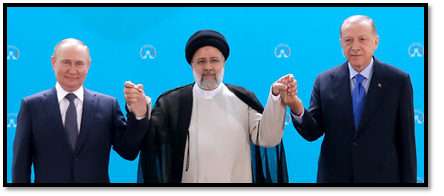July 18
Nuclear: Kamal Kharrazi, an advisor to the Supreme Leader and a former Minister of Foreign Affairs, claimed that Iran has the technical capability to build a nuclear bomb. But it has “not made a decision to build an atomic bomb,” he told Al Jazeera. He said that Iran had conducted military exercises simulating strikes inside Israel in the event of an attack. “Any targeting of our security from neighboring countries will be met with direct response to these countries and Israel,” he warned.
July 19
Diplomacy: Russian President Vladimir Putin visited Tehran to boost ties with his Iranian and Turkish counterparts. The trip came just three days after President Biden toured the region to rally support against Iran. “We can boast record figures in trade growth,” Putin said at the start of his meetings. “We are strengthening our cooperation on international security and making a tangible contribution to settling the Syrian conflict.”

Culture: Award-winning filmmaker Jafar Panahi was ordered to serve an outstanding six-year jail sentence, according to his wife. Panahi had been detained on July 11 after he went to Evin Prison to inquire about the arrest of another director.
Military: Brigadier General Kioumars Heydari, Commander of the Iranian Army Ground Forces, announced that Iran was ready to export “military equipment and weapons.”
Energy: The National Iranian Oil Company and Russia’s Gazprom signed a memorandum of understanding reportedly worth some $40 billion. Gazprom said it would help develop two natural gas fields, and six oil fields, pipelines, and other infrastructure.
Nuclear: Robert Malley, the U.S. special envoy for Iran, warned that window for reviving the 2015 nuclear deal “is closing quite rapidly.” But he would not specify when the agreement is no longer viable. Malley said that Iran’s leadership needed to decide on returning to compliance or continuing down the path of escalation.
July 20
Nuclear: The U.S. intelligence community assesses that Iran has not resumed work on building a nuclear weapon, CIA Director Bill Burns said at the Aspen Security Forum. “But the trend lines are quite troubling,” he warned.
Diplomacy: Syrian Foreign Minister Faisal Mekdad met with his Iranian counterpart Hossein Amir-Abdollahian in Tehran. The two expressed concern over a potential Turkish incursion into northern Syria. “Turkey working on establishing safe zones on Syrian soil will put it in a position of conflict with Damascus,” warned Mekdad. Amir-Abdollahian called for the withdrawal of the estimated 1,000 U.S. troops in Syria. “The east of Euphrates is one of the main resources of Syria's oil and energy. Unfortunately, in recent years, we have seen Syria's natural resources being looted in the region America has occupied.”
